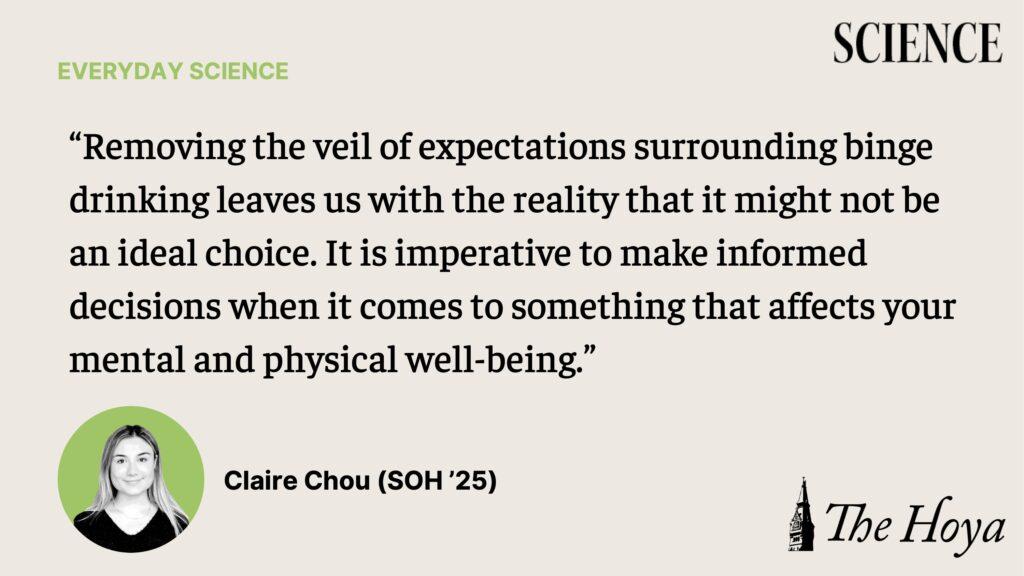Nearly 53% of full-time college students ages 18 to 22 drank alcohol in the past month — and of those who drank, 33% engaged in binge drinking, according to the Substance Abuse and Mental Health Services Administration. Binge drinking, which the National Institutes of Health defines as “consuming 4 or more drinks (female), or 5 or more drinks (male) in about 2 hours,” can result in both short-term and long-term physical and psychological consequences. But knowing how social expectations for binge drinking compare to the scientific realities of drinking’s impacts on our bodies can help us make informed decisions about when, and how much, to consume.
One expectation that many people have about college campuses is that everyone drinks or binge drinks. While 18- to 22-year-olds enrolled in college have higher binge drinking rates compared to their counterparts who are not enrolled in college, because of the “social camaraderie” it fosters, the perception that “everybody drinks” and that drinking above your comfort level is a good way to conform, is a fallacy.
A 2019 study found that 84.8% of college students surveyed overestimated how much their peers drink. The “cognitive disconnect” between what we imagine our peers to be up to versus what they actually are doing is one of many reasons to engage in lower-risk drinking habits.
Another common expectation about drinking deals with “social rewards.” Maybe the social reward for you looks like shooting your shot with your class crush or getting out on the dance floor with your friends with the aid of alcohol.
In reality, alcohol increases the risk of adverse sexual experiences, including nonconsensual sex or other dangerous sexual behavior such as unprotected sex. The bottom line is that while you might be binge drinking to step out of your comfort zone, taking it too far can hinder your ability to function, consent or think through decisions as well as when sober. Instead of inspiring fun, exciting behavior, binge drinking can instead have negative consequences.
Another common expectation about drinking is that it can provide an “emotional escape or relief.” There is some truth that alcohol serves as a tool for relaxation, and the immediate effect of alcohol is typically a positive feeling. This is because alcohol triggers the release of “feel-good” neurochemicals, such as dopamine and different endorphins, by interacting with the reward system in one’s brain.
The mood-boosting effects of alcohol become weaker, however, as one drinks more frequently or heavily. This may lead people to drink more in pursuit of this feeling, resulting in alcohol abuse.
Additionally, if someone is already suffering from depression, the alcohol is likely to amplify these negative feelings. Alcohol consumption ultimately causes a lack of “feel-good” neurochemicals because of a subsequent dopamine imbalance, leaving you feeling sad or anxious. The initial rush comes when alcohol releases dopamine, which the brain eventually responds to by producing less dopamine in an attempt to balance these levels.
Likewise, in the short term, alcohol causes a reduction in sleep quality, hindering information recall, attention and focus. Over time, binge drinking damages the brain’s cognitive functions, specifically “mental activities that involve acquiring, storing, retrieving, and using information.”
Another expectation people have about drinking is that blacking out is normal, or a natural response to alcohol. Blacking out, or “gaps in a person’s memory for events that occurred while they were intoxicated,” happens when a person drinks enough alcohol to prevent memories from being transferred from short-term to long-term storage. This process, which takes place in the hippocampus of the brain, is called “memory consolidation.” The lack of memory consolidation caused by alcohol produces detrimental impacts, as poor decision-making influences the risk of anxiety and injury.
When we look at a college environment like Georgetown University, the “work hard, play hard” culture can lead us to overlook the realities of alcohol. Drinking is presented as a good way to establish balance between high academic achievement and a good lifestyle. However, drinking the night before studying can impede your ability to focus because “sustained attention, short- and long-term memory, and psychomotor speed” are vulnerable to hangovers.
Removing the veil of expectations surrounding binge drinking leaves us with the reality that it might not be an ideal choice. It is imperative to make informed decisions when it comes to something that affects your mental and physical well-being. I’m not saying you need to stop drinking completely, but when it comes to binge drinking, tread carefully.









